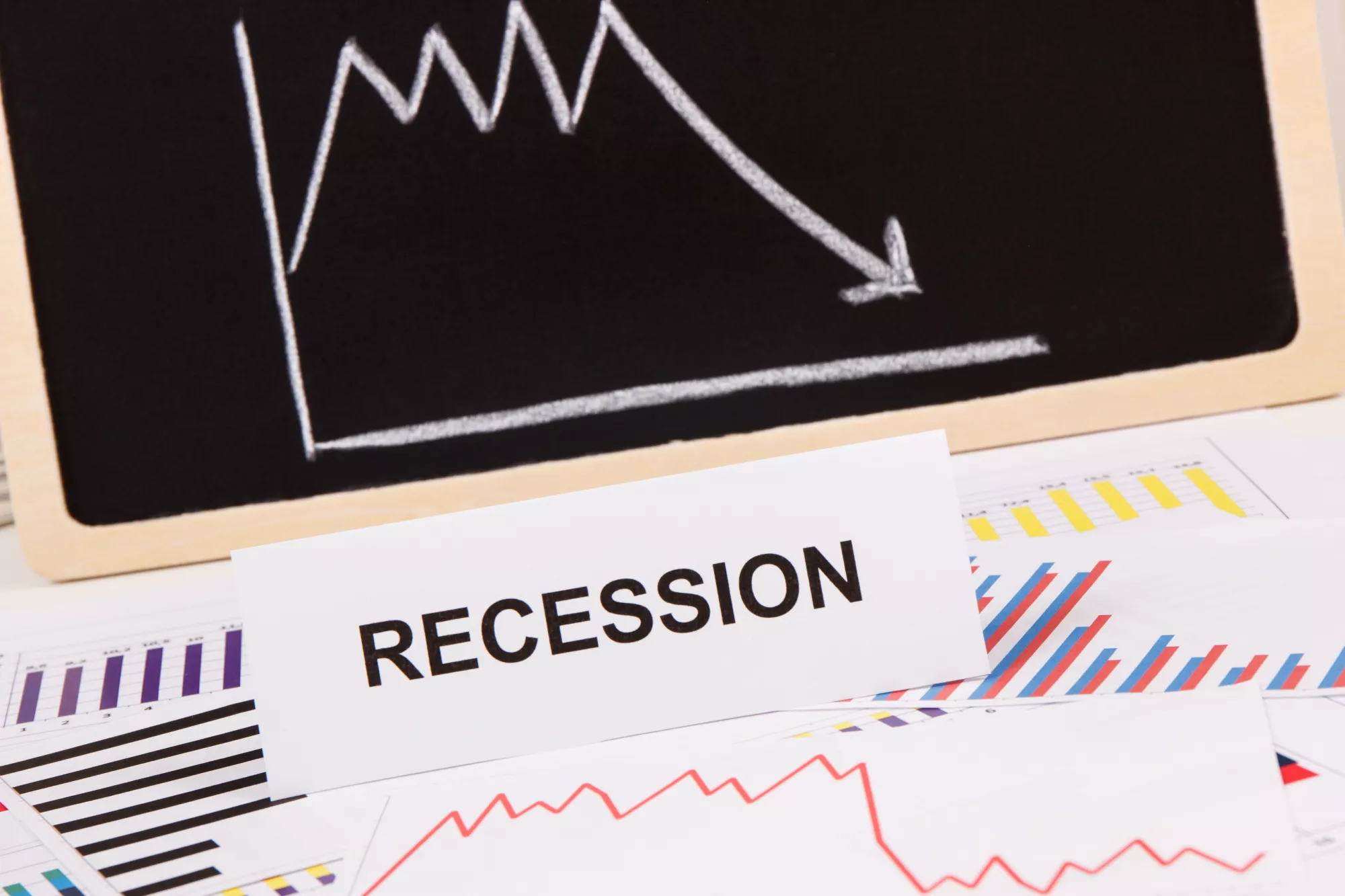
TABLE OF CONTENTS
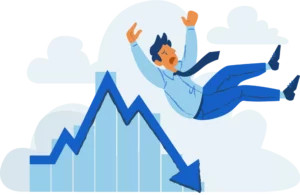
With more than 70% of economists expecting a recession to occur by 2023, now is quite literally the time to prepare for a recession.[1]CNN. “72% of economists expect a US recession by the middle of next year“. Accessed September 16, 2022. While the term “recession” may elicit panic—especially in business owners—there are specific steps you can take to prepare your business for a period of economic contraction. This guide explains how to prepare your business for a recession and lists mistakes to avoid during an economic downturn. We can’t control the economy, but we can help you manage your business when the economy feels especially out of control!
What Is a Recession?
The term “recession” refers to a period of economic decline. A recessionary period is typically declared when an economy experiences two consecutive quarters of negative growth. While financially painful, recessions are actually a natural element of the modern business cycle. Between 1980 and 2009, there were five notable recessions in the United States alone.
Note: An economic recession differs from an economic depression. If you’re interested in the different economic conditions marking these two events, read our recession vs. depression explainer.
What to Expect During a Recession?
When a recession occurs, it can feel like a domino effect—one issue can cause many other events to transpire. For example, a declining employment rate may result in less consumer spending, which may result in less manufacturing output. While each recession is different, making it impossible to predict exactly what will occur, let’s take a look at the three leading scenarios that typically happen during an economic downturn:
1. Lower consumer spending
As a recessionary period develops, consumer spending can drop significantly. When consumers lose confidence in the market, they’re more likely to cut back on spending, reducing economic activity. Between 2007 and 2008, during the Great Recession, consumer spending dropped by 3.6%.[2]CNBC. “10 years after the financial crisis, Americans are still looking for a deal“. Accessed September 16, 2022.
2. Higher unemployment
As the economy slows down and consumer spending declines, businesses can experience cash flow problems. This can result in layoffs, raise unemployment, and further reduce consumer confidence.
3. Credit crunches
The Federal Reserve has jurisdiction over interest rates. During economic downturns, the Fed often reduces interest rates in an effort to encourage business investment and consumer spending. However, this doesn’t always afford more credit to businesses and consumers. With returns on investments more jeopardized during economic hardship, loans can be more challenging to access. Having a strong business credit score can be hugely beneficial in this situation, as even the wariest lenders will see your business as “creditworthy.”
How To Prepare for a Recession
Preparing for a recession can help you and your business weather the impending storm. Below, we review the most effective ways to prepare for a recession.

Clarify your financial priorities
Begin by clarifying your business’s financial priorities. What type of spending is essential to your operations, and what type of spending can it function without? Then, cut costs within your operations by shopping for the lowest rates on your business essentials. By identifying which costs are a priority, you can determine which areas of your budget to nip during a recession.

Set a budget and stick to it
After determining your financial priorities, set a budget. Budgeting helps save working capital, which can be immensely useful during a recession. With plenty of online budget templates and apps on today’s market, building a budget is easier than ever. Many services even link to your bank account, making it simple to track your spending.
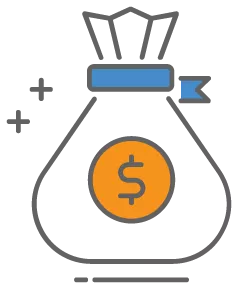
Build up your emergency savings
With a budget in place, it’s time to build up your emergency savings. Establish a target savings amount that will help protect you from letting staff go and other difficult business realities associated with recessions. Determine how much money to save each week and track your progress regularly.
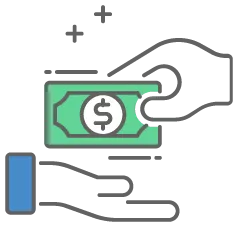
Pay off debt as much as you can
Next, pay down your existing debt as much as possible. Whether you have a business line of credit or credit card subject to higher interest rates, start making payments to reduce the burden. Not only will this help you avoid accruing hefty interest on the principal, but it will also make it easier to access loans in the future should you need emergency funding. Your revolving credit utilization levels play a significant role in your credit rating, so paying down owed debt can help you build your business credit score, enhancing your chances of receiving financing approval.
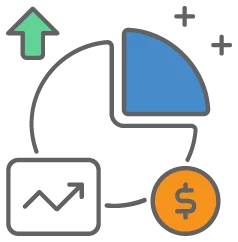
Create multiple income sources
Lastly, creating multiple income streams within your operations can act as an added layer of financial security to your business. You’ll experience a good deal of exposure during an economic collapse if you’re too reliant on a particular source for all of your business’s revenue. If you sell goods, consider offering relevant services, and vice versa. Likewise, if you run a brick-and-mortar location, consider launching an eCommerce site.
Three Financial Mistakes to Avoid in a Recession
While preparing for a recession can help soften its harsh effects, it’s just as critical to act wisely in the midst of a recession. Let’s explore a few mistakes to avoid when an economic contraction begins:
1. Using high-interest debt
While high-interest debt is often more accessible than low-interest debt, it should be avoided during a recession. If you suddenly need a business loan during a recession, shop for the lowest possible interest rates. Additionally, it’s smart to calculate the monthly financial burden associated with a loan before making any commitments.

2. Unnecessary purchases
Unnecessary purchases are a huge mistake during recessions. Even if you have a substantial savings fund, make sure to retain as much money as possible during a market contraction. Since you never know what’s around the corner, there’s no need to spend beyond your business’s means during an economic crash.
3. Selling long-term investments
While it’s easy to panic during a recession, it pays to avoid selling long-term investments—including valuable business assets—as the financial pressure builds up. Contractions and expansions are standard elements of the modern business cycle, so selling after a drop in market prices will likely result in measurable business losses.
Preparing for a Recession with Thin Profit Margins
If your business operates with thin profit margins, preparing for a recession is critical. When consumer demand drops, businesses’ cash flows tend to suffer. For businesses already operating with razor-thin margins, this can be catastrophic. The only way to survive is to ensure your business is prepared. Below lists a few tips that can help businesses operating with thin profit margins prepare for a recession:

Pay down expensive debt
Pay down your business’s most expensive debt before a recession begins. Whether business credit cards or lines of credit, reducing the amount you owe can help to avoid cash crunches when economic conditions decline. If you can’t pay down your expensive debt with cash, consider consolidating your business debt or refinancing options.

Consider new suppliers
Is your business is overpaying for materials? During times of economic prosperity, it’s easy to become complacent about your business expenses, but such complacency during a recession can be a fatal mistake. Start by taking account of your current costs and seeking quotes from other industry competitors.

Start saving now
Don’t wait for the start of a recession to set money aside. Start saving today. Your business’s recession preparation must include building a business emergency fund that covers overhead expenses if consumer demand drops.
Final Thoughts on Preparing for a Recession

With an impending recession looming, it’s wise to prepare for economic changes in the market. The tips in this guide can be useful in maintaining fiscal health amid a plummeting economy. Never underestimate the power of paying down debt and saving money within your business operations. Additionally, by partnering with PaymentCloud, you can effectively prepare your business for a recession by securing better financing options and lower merchant account fees!



